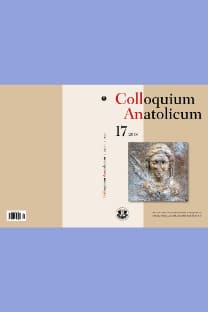The Greek Care of the Self in Foucault and the Athenian Democracy
Foucault'daki Kendiliğin Yunan Bakımı ve Atina Demokrasisi
___
- Arist. Ath. Pol. Aristotle, Athenian Constitution. Eudemian Ethics. Virtues and Vices, H.
- Rackham (trans.), Cambridge, Mass. (Loeb Classical Library), 1935.
- Arist. Pol. Aristotle, Politics, H. Rackham (trans.), Cambridge, Mass. (Loeb Classical Library), 1932. Aristoph. Ran.
- Aristophanes, Frogs. Assembly Women. Wealth, J. Henderson (trans.), Cambridge, Mass. (Loeb Classical Library), 2003.
- Athen. Athenaeus, The Learned Banqueters, vols. I-VIII, S.D. Olson (trans.), Cambridge, Mass. (Loeb Classical Library), 2007-2012.
- Dem. Demosthenes, Orations, vols. I-VII, A.T. Murray – J.H. Vince, N.W. DeWitt – N.J. DeWitt (trans.), Cambridge, Mass. (Loeb Classical Library), 1930-1949.
- Diog. Laert. Diogenes Laertius, Lives of Eminent Philosophers, vols. I-II, R.D. Hicks (trans.), Cambridge, Mass.
- (Loeb Classical Library), 1925. Hdt. Herodotus, The Persian Wars, vols. I-IV, A.D. Goldey (trans.), Cambridge, Mass. (Loeb Classical Library), 1920-1925.
- Hes. Op. Hesiod, Theogony. Works and Days. Testimonia, G.W. Most (trans.), Cambridge, Mass. (Loeb
- Classical Library), 2007. Hom. Od. Homer, Odyssey, vols. I-II, A.T. Murray (trans.), Cambridge, Mass. (Loeb Classical Library), 1919.
- Hyp. Hyperides, Minor Attic Orators, Volume II: Lycurgus. Dinarchus, Demades, Hyperides, J.O. Burtt (trans.), Cambridge, Mass. (Loeb Classical Library), 1954.
- Pl. Alc. Plato, Charmides. Alcibiades I and II. Hipparchus. The Lovers. Theages.
- Minos. Epinomis, W.R.M. Lamb (trans.), Cambridge, Mass. (Loeb Classical Library), 1927.
- Pl. Gorg. Plato, Lysis. Symposium. Gorgias, W.R.M. Lamb (trans.), Cambridge, Mass.
- (Loeb Classical Library), 1925. Pl. Prot.
- Plato, Laches. Protagoras. Meno. Euthydemus, W.R.M. Lamb (trans.), Cambridge, Mass. (Loeb Classical Library), 1924.
- Pl. Rep. Plato, Republic vols. I-II, W. Preddy – C. Emilyn-Jones (trans.), Cambridge, Mass. (Loeb Classical Library), 2013.
- Plato, Tiameus. Ciritias. Cleitophon. Menexenus. Epistles, R.G. Bury (trans.), Cambridge, Mass.
- (Loeb Classical Library), 1929. Plut. Alc.
- Plutarch, Lives, Volume IV: Alcibiades and Coriolanus. Lysander and Sulla, B. Perrin (trans.), Cambridge, Mass. (Loeb Classical Library), 1916.
- Plut. Mor. Plutarch Moralia, vols. I-XVI, C. Harnold et al. (trans.), Cambridge, Mass. (Loeb Classical Library), 1927-2004.
- Plut. Per. Plutarch, Lives, Volume III: Pericles and Fabius Maximus. Nicias and Crassus, B. Perrin (trans.), Cambridge, Mass. (Loeb Classical Library), 1916.
- Thuc. Thucydides, History of the Peloponnesian War, vols. I-IV, C.F. Smith Mass.,
- Cambridge, Mass. (Loeb Classical Library), 1919-1921. Xen. Cyr.
- Xenophon, Cyropaedia vols. I-II, W. Miller (trans.), Cambridge, Mass. London (Loeb Classical Library), 1914
- ISSN: 1303-8486
- Yayın Aralığı: 1
- Başlangıç: 2002
- Yayıncı: Türk Eskiçağ Bilimleri Enst.
Türbe Höyük II. Late Bronze Age Pottery
The Greek Care of the Self in Foucault and the Athenian Democracy
New Archeological Finds in Hierapolis Ploutonion Between Hades and Kybele
The Kurul Fortress and the Cult of Kybele as a City Protector
Philologische und geographische Bemerkungen zu den Toponymen der KULULU-Bleistreifen
